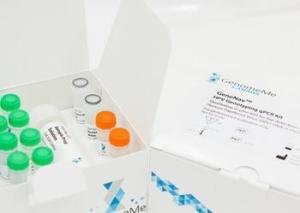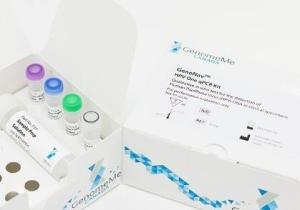
|



| 产地 | 中国 |
| 品牌 | GenomeMe |
| 货号 | IHC654 |
| 用途 | |
| 包装规格 | |
| 纯度 | % |
| CAS编号 | |
| 是否进口 |
前列腺特异性抗原PSA
背景描述Description:
前列腺特异性抗原(PSA)是激肽释放酶家族的一种丝氨酸蛋白酶,由前列腺上皮和尿道周围腺体的上皮内壁产生。虽然PSA被认为是前列腺特异的,但在乳腺组织、乳腺肿瘤、子宫内膜、肾上腺肿瘤和肾细胞癌中也检测到PSA。抗PSA抗体可用于鉴别*别前列腺癌和*别泌尿系上皮癌,也可用于非前列腺组织中前列腺癌起源的判断。抗PSA抗体可识别原发和转移性前列腺肿瘤,但不能识别非前列腺来源的肿瘤,可作为确定原发和转移癌中前列腺腺泡细胞来源的辅助手段。
Prostate-Specific Antigen (PSA) is a serine protease of the kallikrein family, that is produced by the prostate epithelium and epithelial lining of the periurethral glands. Although considered prostate-specific, PSA has also been detected in breast tissue, breast tumors, endometrium, adrenal neoplasms, and renal cell carcinomas. Anti-PSA can be used for differentiating high-grade prostate adenocarcinoma from high-grade urothelial carcinoma, as well as for determining the prostatic origin of carcinomas in non-prostate tissues. Anti-PSA recognizes primary and metastatic prostatic neoplasms, but not tumors of nonprostatic origin, and can be useful as an aid to confirm prostatic acinar cell origin in primary and metastatic carcinomas.
Specifications:
Clone: IHC654
Source: Mouse Monoclonal
Positive Control: Prostate, Prostate Carcinoma
Dilution Range: 1:50-1:200
参考文献References:
Polascik TJ, et al. J Urol. 1999; 162:293-306.
Stenman UH, et al. Semin Cancer Biol. 1999; 9:83-93.
Alanen KA, et al. Path Res Pract. 1996; 192:233-7.
Varma M, et al. Histopathology. 2005; 47:1-16.
Gallee MP, et al. Prostate. 1986; 9:33-45.
Hadji M, et al. Cancer. 1981; 48:1229-32.
Tazawa K, et. al. Path Intl. 1999; 49:500-5.
Siddiqui IA, et. al. Carcinogenesis. 2006; 27:833-9.
Ljung G, et. al. Prostate. 1997; 31:91-7.